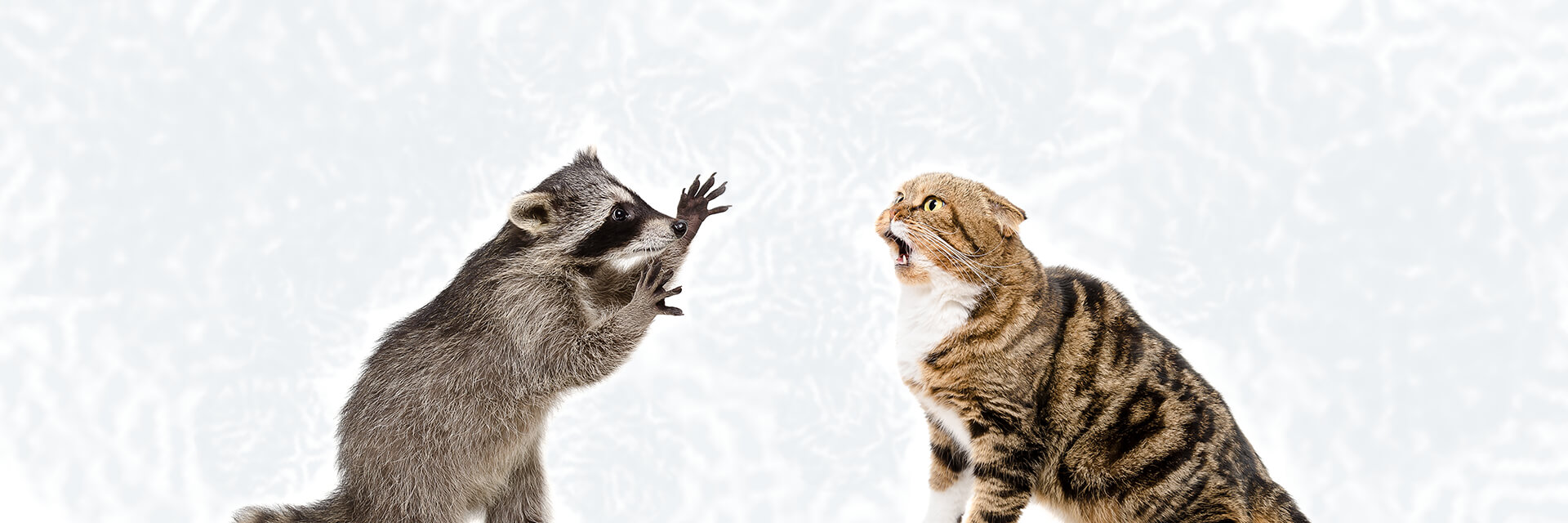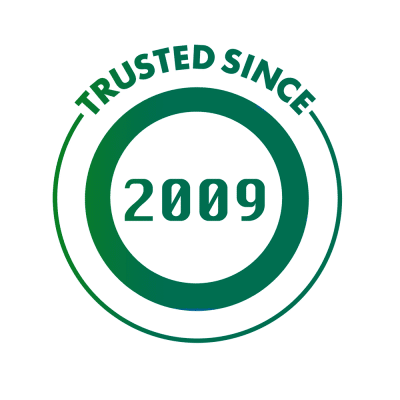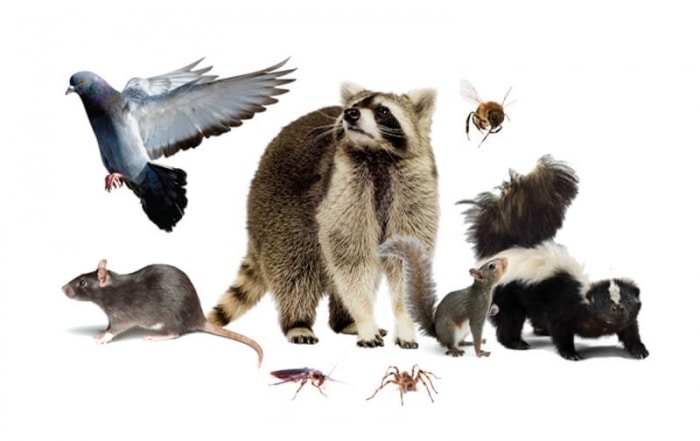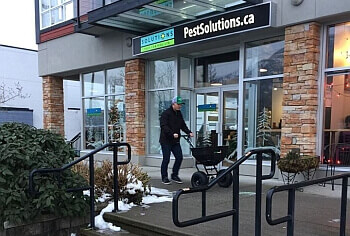
Wildlife Control Services
We all love to watch wildlife from a distance but having one live in the walls or rafters of your home is a bit too close for comfort. Not only do they cause damage and make noise in the walls they are a health hazard to humans.
Solutions Pest Control preferred approach to wildlife control is to gently nudge them back out into their natural surroundings to find an appropriate and permanent place to live.
Humane Wildlife Control Services
Wildlife Control is defined differently by others in the pest control industry. However, at Solutions Pest Control, we define Wildlife Control as the humane removal of wildlife from your home and living areas; and then the prevention of future wildlife problems.
The “humane” part is simple. Solutions Pest Control avoids the use of live trapping and relocation if at all possible. When the animal is trapped and relocated, it is taken out of its territory and away from its family and food supplies. This greatly reduces the chances of survival.
Allowing the wildlife to remain in its natural territory while excluding it from your home (or business) ensures the delicate balance between humans and animals is preserved.
Find out more about our Wildlife Control Treatments.
Local Wildlife Problems
The most common wildlife that home owners or businesses in Metro Vancouver are likely to encounter are Bats, Squirrels, Raccoons, Skunks, Possum & Birds.
Squirrels, Raccoons and Skunks can be found in every neighbourhood from Meto Vancouver to Whistler and Pemberton.
If you have one of “these guys” in your home right now, you may want to see our blog about “What To Do If A Wild Animal Gets Into Your Home”
Bats and some other wildlife species are protected under BC laws. You may want to give us a call before you consider wildlife removal a DYI project. At the very least we can give you some precautionary advice.
Birds are a complex issue because of the diversity in size, species and characteristics of birds. We have an entire page describing issues around controlling birds as pests.
Bats
Bats are beneficial to the environment, however, there are reasons for homeowners to be concerned.
- Bat Fact:
- Bats play an important role in our environment as they can consume up to 3,000 insects in one night.
- Bat Fact:
- F.Y.I Bats are protected under the Wildlife Act. For this reason, you should never attempt to deal with bats on your own but instead, call a professional.
Squirrles
Raccoons
Skunks
Possums
Moles
Wildlife Pest Control Treatments
Remove Wildlife from your home
While pests may range from potentially dangerous to mostly annoying, there are none that you will want to keep in your home. Solutions Pest Control understands that the safety of your home and family is of utmost importance, and we’re here to help you deal with all pest infestations.
At Solutions Pest Control we understand that our community lives in harmony with nature. When things get out of balance and nature encroaches into our home or endangers our family then we need to push back, but just to restore the balance. In general, our Wildlife Treatments are to:
- Remove the animal from your home back to their natural habitat
- Perform remedial exclusion, that is plug the holes and prevent the animal from entering the home again
- Customer education, identify what may be attracting the animal to your home so that the animal is not inadvertently “invited” to return.
The specifics of the Wildlife Treatment will vary depending on the species of the pest.
Dealing With Protected Species
Certain precautions must be taken with protected species like bats, due to their protected status. In such cases, simple extermination cannot be considered. Rather, a process of “exclusion” can be used to remove them. This involves sealing up entry points and leaving a single exit which is fitted with one-way doors that allow the animal to leave, but not re-enter the home. In some cases, hand removal of the pests may be called for.
Planning a Pest-Free Future
Once the pest is gone, we continue to work with you, repairing access points, looking for other possible weaknesses that might allow ingress, and showing you ways to discourage pests from returning, such as eliminating food sources. Your property should be attractive to you, not to them!
Pest Control has as much to do with Education as it does with Eradication.
Jason Page, President of Solutions Pest Control
Call Solutions Pest Control for Wildlife Pest Problems
Whatever the job requires, Solutions Pest Control will get the job done, freeing your home or business property of all invaders so that you can rest easy knowing that your property, your family, and your employees are safe.
Solutions To Your Pest Control Issues
Dealing with wildlife infestations can be a trying experience. That’s why when you have problems, you need Solutions. Protect your home and your loved ones with professional wildlife control solutions so that you can enjoy your environment without these nuisance pests.
Our team is ready to solve your pest issues, call Solutions Pest Control today!
Or Schedule a Service Call Now!
Wildlife Control Services
We all love to watch wildlife from a distance but having one live in the walls or rafters of your home is a bit too close for comfort. Not only do they cause damage and make noise in the walls they are a health hazard to humans.
Solutions Pest Control preferred approach to wildlife control is to gently nudge them back out into their natural surroundings to find an appropriate and permanent place to live.
Humane Wildlife Control Services
Wildlife Control is defined differently by others in the pest control industry. However, at Solutions Pest Control, we define Wildlife Control as the humane removal of wildlife from your home and living areas; and then the prevention of future wildlife problems.
The “humane” part is simple. Solutions Pest Control avoids the use of live trapping and relocation if at all possible. When the animal is trapped and relocated, it is taken out of its territory and away from its family and food supplies. This greatly reduces the chances of survival.
Allowing the wildlife to remain in its natural territory while excluding it from your home (or business) ensures the delicate balance between humans and animals is preserved.
Find out more about our Wildlife Control Treatments.
Local Wildlife Problems
The most common wildlife that home owners or businesses in Metro Vancouver are likely to encounter are Bats, Squirrels, Raccoons, Skunks, Possum & Birds.
Squirrels, Raccoons and Skunks can be found in every neighbourhood from Meto Vancouver to Whistler and Pemberton.
If you have one of “these guys” in your home right now, you may want to see our blog about “What To Do If A Wild Animal Gets Into Your Home”
Bats and some other wildlife species are protected under BC laws. You may want to give us a call before you consider wildlife removal a DYI project. At the very least we can give you some precautionary advice.
Birds are a complex issue because of the diversity in size, species and characteristics of birds. We have an entire page describing issues around controlling birds as pests.
Bats
Bats are beneficial to the environment, however, there are reasons for homeowners to be concerned.
- Bat Fact:
- Bats play an important role in our environment as they can consume up to 3,000 insects in one night.
- Bat Fact:
- F.Y.I Bats are protected under the Wildlife Act. For this reason, you should never attempt to deal with bats on your own but instead, call a professional.
Squirrles
Raccoons
Skunks
Possums
Moles
Wildlife Pest Control Treatments
Remove Wildlife from your home
While pests may range from potentially dangerous to mostly annoying, there are none that you will want to keep in your home. Solutions Pest Control understands that the safety of your home and family is of utmost importance, and we’re here to help you deal with all pest infestations.
At Solutions Pest Control we understand that our community lives in harmony with nature. When things get out of balance and nature encroaches into our home or endangers our family then we need to push back, but just to restore the balance. In general, our Wildlife Treatments are to:
- Remove the animal from your home back to their natural habitat
- Perform remedial exclusion, that is plug the holes and prevent the animal from entering the home again
- Customer education, identify what may be attracting the animal to your home so that the animal is not inadvertently “invited” to return.
The specifics of the Wildlife Treatment will vary depending on the species of the pest.
Dealing With Protected Species
Certain precautions must be taken with protected species like bats, due to their protected status. In such cases, simple extermination cannot be considered. Rather, a process of “exclusion” can be used to remove them. This involves sealing up entry points and leaving a single exit which is fitted with one-way doors that allow the animal to leave, but not re-enter the home. In some cases, hand removal of the pests may be called for.
Planning a Pest-Free Future
Once the pest is gone, we continue to work with you, repairing access points, looking for other possible weaknesses that might allow ingress, and showing you ways to discourage pests from returning, such as eliminating food sources. Your property should be attractive to you, not to them!
Pest Control has as much to do with Education as it does with Eradication.
Jason Page, President of Solutions Pest Control
Call Solutions Pest Control for Wildlife Pest Problems
Whatever the job requires, Solutions Pest Control will get the job done, freeing your home or business property of all invaders so that you can rest easy knowing that your property, your family, and your employees are safe.
Solutions To Your Pest Control Issues
Dealing with wildlife infestations can be a trying experience. That’s why when you have problems, you need Solutions. Protect your home and your loved ones with professional wildlife control solutions so that you can enjoy your environment without these nuisance pests.
Our team is ready to solve your pest issues, call Solutions Pest Control today!
Or Schedule a Service Call Now!
Wildlife Control Blog
We gathered the following, most recent Wildlife Control posts from Solutions Pest Control’s – Bug Blog. These are topical posts we’ve written over the years about wildlife pest issues in Metro Vancouver and Whistler Sea-to-Sky corridor area. If your neighbours had these issues in the past, our bug blog posts might be relevant to your concerns today.
Your Solution to Wildlife Control
Sure they look cute and cuddly, but do you really want wildlife infesting your home or place of business? Squirrels, rats, mice, raccoons, and skunks—all of these troublesome pests can [...]
Why Regular Pest Control is So Important
We are certain that no one likes to have pests, such as bugs and rodents, in their home. Most people are familiar with exterminators’ pest control type services and the [...]
5 Steps to find good Vancouver Pest Control Companies
Finding ants marching through your home, rodents foraging for food, or bed bugs nesting in your mattress can all be serious problems. Choosing the right Vancouver pest control company, however, [...]
Bug Blogs
There is a great deal of information in our Bug Blog posts, perhaps one will address the pest issues you are experiencing today. Please have a look at our Bug Blog page and give us a call if we can answer any questions.
Pest Control Services For Businesses And Homes
We offer a variety of local pest control services like monthly pest control services can effectively assist your property needs every month for your business or strata building. Rats can be hard to get rid.
Speak to us about our pest control Vancouver options to rid yourself of popular critters that linger around the port cities and make their way inward from the river. We keep the pests away for good! Your monthly pest management issues can vary slightly depending on how close you are to water.
Experienced Pest Control Can Rid Your Pest Quick!
Licensed and Insured: Our pest removal and bed bug treatment experts are licensed, insured, and certified to provide the highest-quality pest control services.
Customized Solutions: We understand that every pest or spider infestation is unique, which is why we provide customized solutions tailored to your specific needs and budget.
Safe and Eco-Friendly: We use safe and eco-friendly exterminators for mice, rats, and even insects. Insect exterminators can rid your place of ants, spiders, moths, carpenter ants, fire ants and more. We use different ant exterminator methods or products to protect your property, pets, and the environment.
Guaranteed Results: We stand behind our work and offer a satisfaction guarantee for all our bed bug control services. Contact us today to get started with professional pest control, bed bug removal, and ant control and pest removal solutions.

Seeing the trend here? Another port city with easy access to garbage bins and warm dry shelter away from the consistently wet outdoor conditions that naturally occur in our region. Speak to the experts at the leading pest management services in the lower mainland.
We service the entire region including Whistler, Squamish, West Vancouver, Vancouver , New Westminster, to Surrey residents and businesses with great pest removal options! Learn more about monthly pest control in lower mainland for commercial business owners, apartment buildings, strata councils, home care providers, and restaurants.
Our clients are our #1 priority. At Solutions Pest Control, we will work with you to create a customized plan that is tailored to your specific needs. We know that every customer has different needs and goals, and we take the time to find out what those are before we begin any work.
Once we have a solid understanding of what you are looking for, we can also match you with the appropriate exterminator services like bed bug treatment and ant control solutions that fit your budget and schedule perfectly!
Contact Solutions Pest Control today at call 1-855-858-9776 Or Schedule a Service Call Now!








